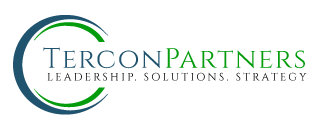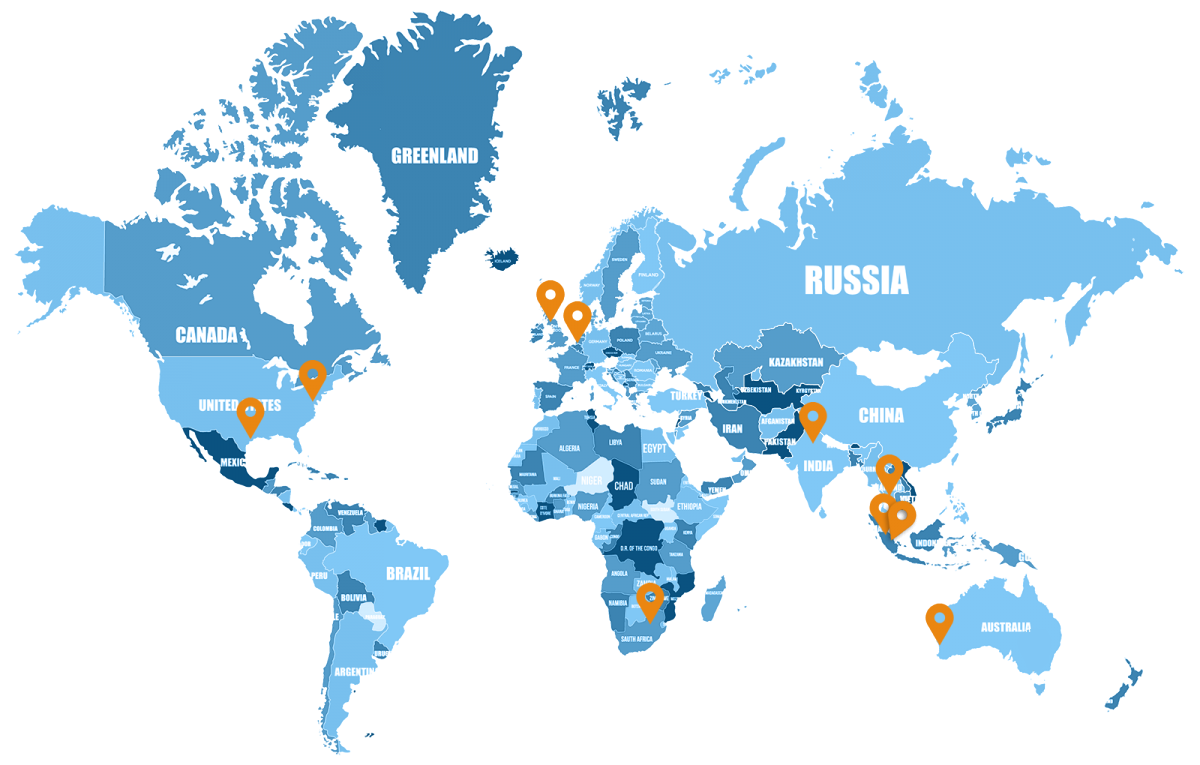TerconPartners – Global Leaders in Capital Project Team Development Consulting
“The success of a Capital Project today depends as much on strong teaming and collaboration skills as strong technical skills.”
TerconPartners – Global Leaders in Capital Project Team Development Consulting
“The success of a Capital Project today depends as much on strong teaming and collaboration skills as strong technical skills.”
TerconPartner’s Comment:
“Today’s project managers and team leaders must be able to understand people as well as they understand projects.”
TerconPartner’s Comment:
“Today’s project managers and team leaders must be able to understand people as well as they understand projects.”
Introducing Tercon’s Project Performance Improvement Center
For the past 30 years, TerconPartners has provided sustainable, cost-effective performance improvement solutions to engineering & construction projects in the global energy industry.
As experienced industry professionals head for retirement, Tercon provides solutions that help companies attract new people with the analytical and digital skills needed for companies to compete successfully in the new business environment.

Top industry challenge today – How to Close Performance Gaps Quickly?
Three important trends we want to share with you:
- Performance gaps are escalating in the workforce. Many new hires lack industry experience, lack specific job knowledge for their positions, and lack the people skills training needed when leading in the new business environment.
- Upskilling supervisors and team leads in topics including building teams and managing change must become a company priority in the industry. Additionally, after employees have received skill-based training in core people management skills, they need frequent, ongoing feedback to sustain what has been learned.
- Finally, Gallup’s recent research found that employees who work in high empowerment/high engagement work cultures close performance gaps significantly faster than people working in low engagement/low empowerment work cultures. Culture-building is one of Tercon’s core strengths. Please contact us for details and an overview of our Culture Strengths Assessment®.
How TerconPartners Adds Value for Your Company Today
Tercon’s globally validated coaching programs and training modules ensure that project leaders and technical professionals have the skills needed to succeed in the new business environment.
 Professional development training modules for Leaders & Managers.
Professional development training modules for Leaders & Managers.
Participants will learn how to: 1.) Set clear direction, 2.) Guide transformational change, 3.) Develop an inclusive and collaborative work culture, 4.) Provide actionable performance feedback, and 5.) Resolve team conflicts quickly and constructively.
(The five two-hour modules are available through online facilitated sessions or delivered on-site.)
Professional Development Modules for Team Leads and Technical Specialists.
Participants will learn how to: 1.) Communicate with credibility and authority, 2.) Manage relationships with Emotional Intelligence, 3.) Improve the quality of online meetings and work sessions, 4.) Engage and motivate others, 5.) Resolve conflicts and settle disagreements.
(Five two-hour modules are available through on-line facilitated sessions or delivered on-site.)
 Other training modules currently available:
Other training modules currently available:
- Trust-building Skills for Leaders
- Resolving Team Performance Problems
- Establishing an Engaging Company Culture
- Best Practices for Online Meetings & Work Sessions
- Leading Transformational Change
7 Step Process for Closing Employee Performance Gaps
TerconPartner’s Core Services for Capital Projects:
Aligning and coaching owner-contractor leadership teams & organizations.
Providing customized development coaching for project managers and team leads.
Providing “just in time” coaching and training for individual project teams.
Introducing Tercon’s Project Performance Improvement Center
For the past 30 years, TerconPartners has provided sustainable, cost-effective performance improvement solutions to the global energy industry.
As experienced industry professionals head for retirement, Tercon provides solutions that help companies attract new people with the analytical and digital skills needed for companies to compete successfully in the new business environment.

Top industry challenge today – How to Close Performance Gaps Quickly?
Three important trends we want to share with you:
- Performance gaps are escalating in the workforce. Many new hires lack industry experience, lack specific job knowledge for their positions, and lack the people skills training needed when leading in the new business environment.
- Upskilling supervisors and team leads in topics including building teams and managing change must become a company priority in the industry. Additionally, after employees have received skill-based training in core people management skills, they need frequent, ongoing feedback to sustain what has been learned.
- Finally, Gallup’s recent research found that employees who work in high empowerment/high engagement work cultures close performance gaps significantly faster than people working in low engagement/low empowerment work cultures. Culture-building is one of Tercon’s core strengths. Please contact us for details and an overview of our Culture Strengths Assessment®.
How TerconPartners Adds Value for Your Company Today
Tercon’s globally validated coaching programs and training modules ensure that project leaders and technical professionals have the skills needed to succeed in the new business environment.
 Professional development training modules for Leaders & Managers.
Professional development training modules for Leaders & Managers.
Participants will learn how to: 1.) Set clear direction, 2.) Guide transformational change, 3.) Develop an inclusive and collaborative work culture, 4.) Provide actionable performance feedback, and 5.) Resolve team conflicts quickly and constructively.
(The five two-hour modules are available through online facilitated sessions or delivered on-site.)
Professional Development Modules for Team Leads and Technical Specialists.
Participants will learn how to: 1.) Communicate with credibility and authority, 2.) Manage relationships with Emotional Intelligence, 3.) Improve the quality of online meetings and work sessions, 4.) Engage and motivate others, 5.) Resolve conflicts and settle disagreements.
(Five two-hour modules are available through on-line facilitated sessions or delivered on-site.)
 Other training modules currently available:
Other training modules currently available:
- Trust-building Skills for Leaders
- Resolving Team Performance Problems
- Establishing an Engaging Company Culture
- Best Practices for Online Meetings & Work Sessions
- Leading Transformational Change
TerconPartner’s Core Services for Capital Projects:
Aligning and coaching owner-contractor leadership teams & organizations.
Providing customized development coaching for project managers and team leads.
Providing “just in time” coaching and training for individual project teams.
The Changing World of Project Management
Escalating costs, the rapid expansion of digital technologies, and increased globalization require that project delivery teams be more empowered and autonomous than in the past. To make their best contributions, teams need to be “lead” not “managed.”
Bottom line: “Knowledge is not Power unless it is shared.”
Project Management Challenge # 1: How to ensure project managers have the relational skills to build high performing teams that keep members engaged and motivated.
Over the past thirty years of project consulting, TerconPartner’s has observed that when project leaders lack strong interpersonal skills, the following things are more likely to happen:
1.) Close collaboration and joint problem-solving are not routinely encouraged by the leader.
2.) Team meetings focus primarily on task-related issues with little focus on building relationships and establishing trust.
3.) Minor team disagreements within and between teams can escalate to full-blown conflicts because the leader waits too long to intervene, hoping the conflict will resolve itself.
Top Project Management Challenges
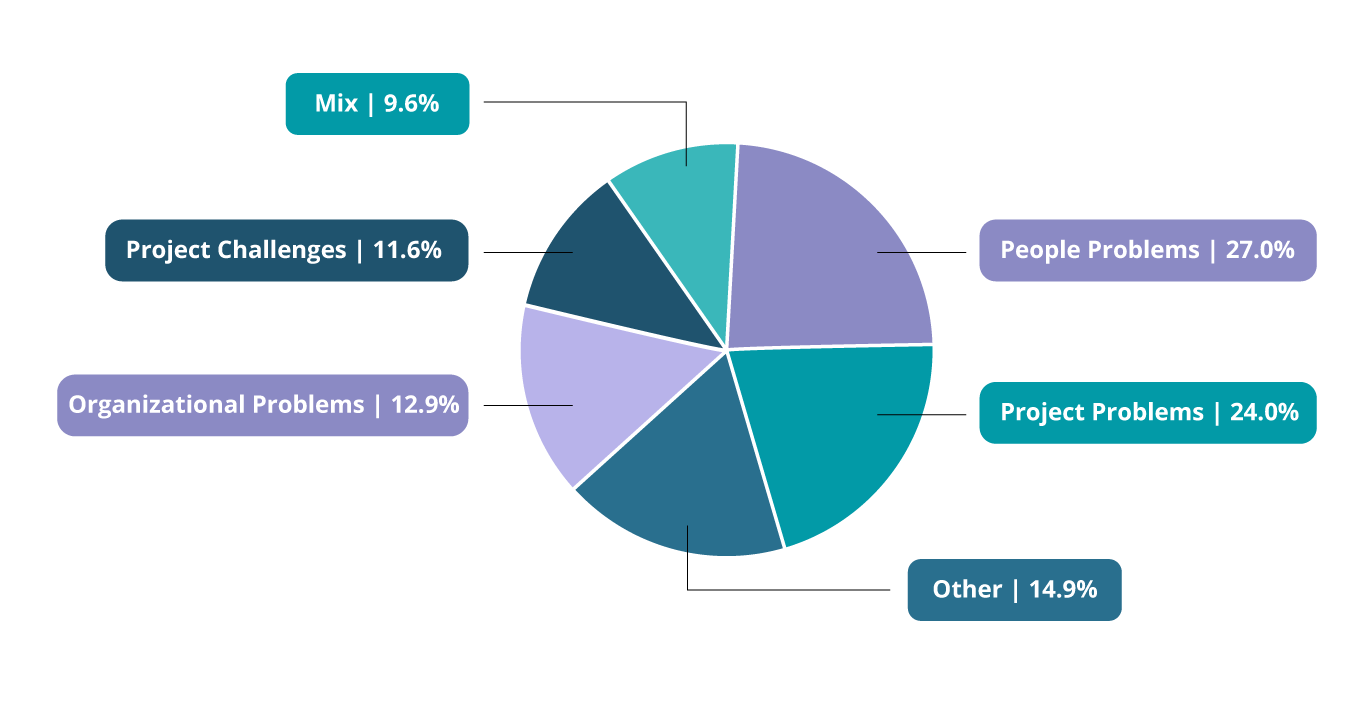
This survey conducted by the Digital Management Community asked respondents to identify their current top project management challenges. “People Problems” ranked the highest. Examples cited included personality clashes, unwillingness to collaborate, “toxic” teams and people, and the absence of effective problem-solving skills.
TerconPartner’s Observation:
Strong interpersonal skills ensure that technical skills can be more fully leveraged and applied.
Changing Workforce Demographics: How they will impact how projects are managed.
A culturally diverse and multigenerational workforce means that all project leaders must leverage both their interpersonal and technical skills when:
- Leading and coaching teams of younger, well-educated, and multidisciplinary project professionals.
- Influencing and negotiating with multiple project stakeholders.
- Establishing trust-based relationships in the owner and contractor organizations.
- Supporting professional development needs by providing frequent and specific performance feedback and mentoring.
- Resolving task and relationship conflicts before they start to distract from work priorities or add to project costs.
The Changing World of Project Management
Escalating costs, the rapid expansion of digital technologies, and increased globalization require that project delivery teams be more empowered and autonomous than in the past. To make their best contributions, teams need to be “lead” not “managed.”
Bottom line: “Knowledge is not Power unless it is shared.”
Project Management Challenge # 1: How to ensure project managers have the relational skills to build high performing teams that keep members engaged and motivated.
Over the past thirty years of project consulting, TerconPartner’s has observed that when project leaders lack strong interpersonal skills, the following things are more likely to happen:
1.) Close collaboration and joint problem-solving are not routinely encouraged by the leader.
2.) Team meetings focus primarily on task-related issues with little focus on building relationships and establishing trust.
3.) Minor team disagreements within and between teams can escalate to full-blown conflicts because the leader waits too long to intervene, hoping the conflict will resolve itself.
Top Project Management Challenges

This survey conducted by the Digital Management Community asked respondents to identify their current top project management challenges. “People Problems” ranked the highest. Examples cited included personality clashes, unwillingness to collaborate, “toxic” teams and people, and the absence of effective problem-solving skills.
TerconPartner’s Observation:
Strong interpersonal skills ensure that technical skills can be more fully leveraged and applied.
Changing Workforce Demographics: How they will impact how projects are managed.
A culturally diverse and multigenerational workforce means that all project leaders must leverage both their interpersonal and technical skills when:
- Leading and coaching teams of younger, well-educated, and multidisciplinary project professionals.
- Influencing and negotiating with multiple project stakeholders.
- Establishing trust-based relationships in the owner and contractor organizations.
- Supporting professional development needs by providing frequent and specific performance feedback and mentoring.
- Resolving task and relationship conflicts before they start to distract from work priorities or add to project costs.

Project Management Challenge # 2: How to Sustain Trust-Based Relationships across virtual and distributed project teams.
“Trust is the willingness to accept vulnerability based on positive expectations about the intentions of another person or group.”
When Trust is high on a project team:
- Communication is open and timely across all parts of the project: owners, engineering, constructors.
- Information flows to the people who need it.
- Customer and vendor relationships are collaborative.
- Productivity is high.
When Trust is low on a project team:
- Communication and information-sharing are low.
- Team members suspect ulterior motives in others.
- Problems may get swept under the rug.
- Blame-placing occurs when something goes wrong.

Project Management Challenge # 2: How to Sustain Trust-Based Relationships across virtual and distributed project teams.
“Trust is the willingness to accept vulnerability based on positive expectations about the intentions of another person or group.”
When Trust is high on a project team:
- Communication is open and timely across all parts of the project: owners, engineering, constructors.
- Information flows to the people who need it.
- Customer and vendor relationships are collaborative.
- Productivity is high.
When Trust is low on a project team:
- Communication and information-sharing are low.
- Team members suspect ulterior motives in others.
- Problems may get swept under the rug.
- Blame-placing occurs when something goes wrong.
Trust is a Business Imperative on Capital Projects Today
* All parties come to a capital project with the same intentions: 1.) To safely construct a well-functioning final product that satisfies the customer, and 2.) To maximize their own company’s profitability.
* The good news; well–managed projects with high collaboration and trust between owners and constructors are much more likely to be profitable.
* Inevitably, however, schedule, cost, and technical issues that arise must be addressed quickly to achieve business goals.
* Experience confirms that how business partners respond to each other when problems arise is based upon the degree of “earned trust”, or lack of it, in the relationship.
Increasing Trust Between Owners & Contractors Must Be A Priority on all Capital Projects Today. This is where Team Development Consulting comes in.

Symptoms of Low Trust on Teams
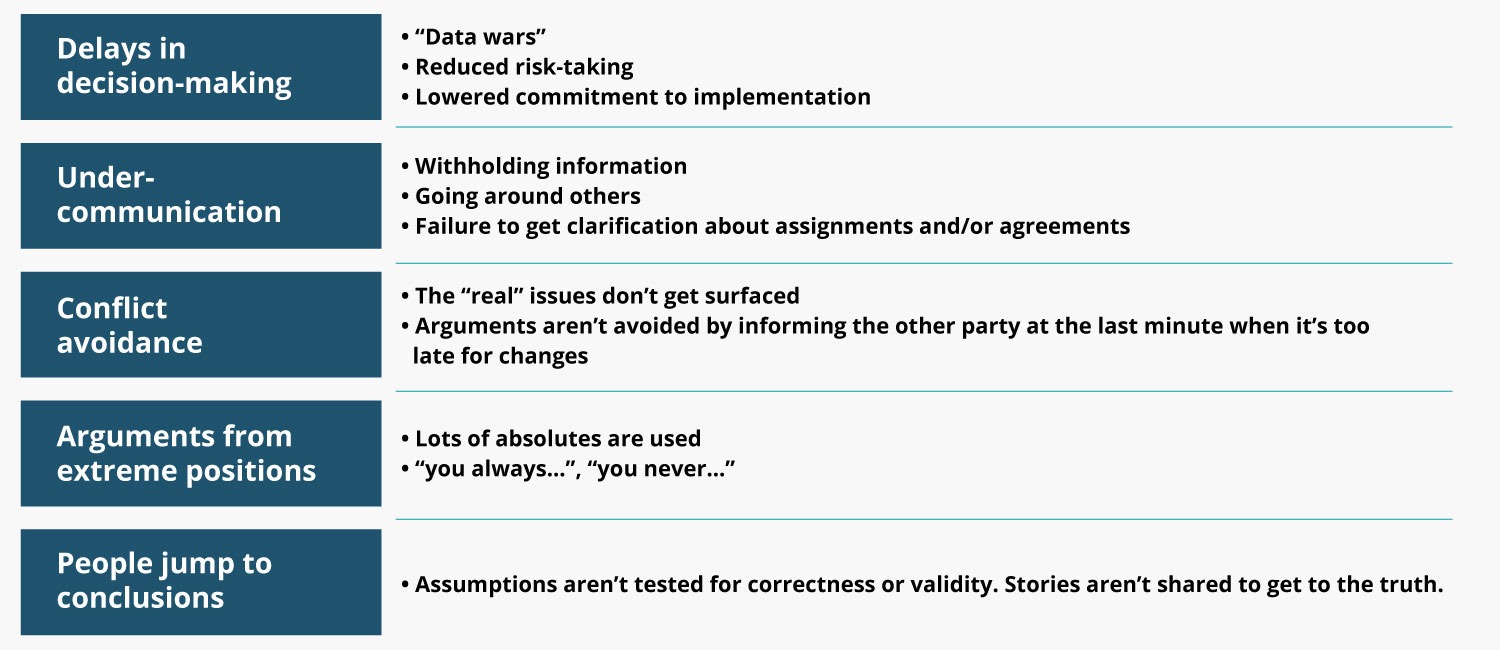
A Project’s Culture is Shaped by the People at the Top

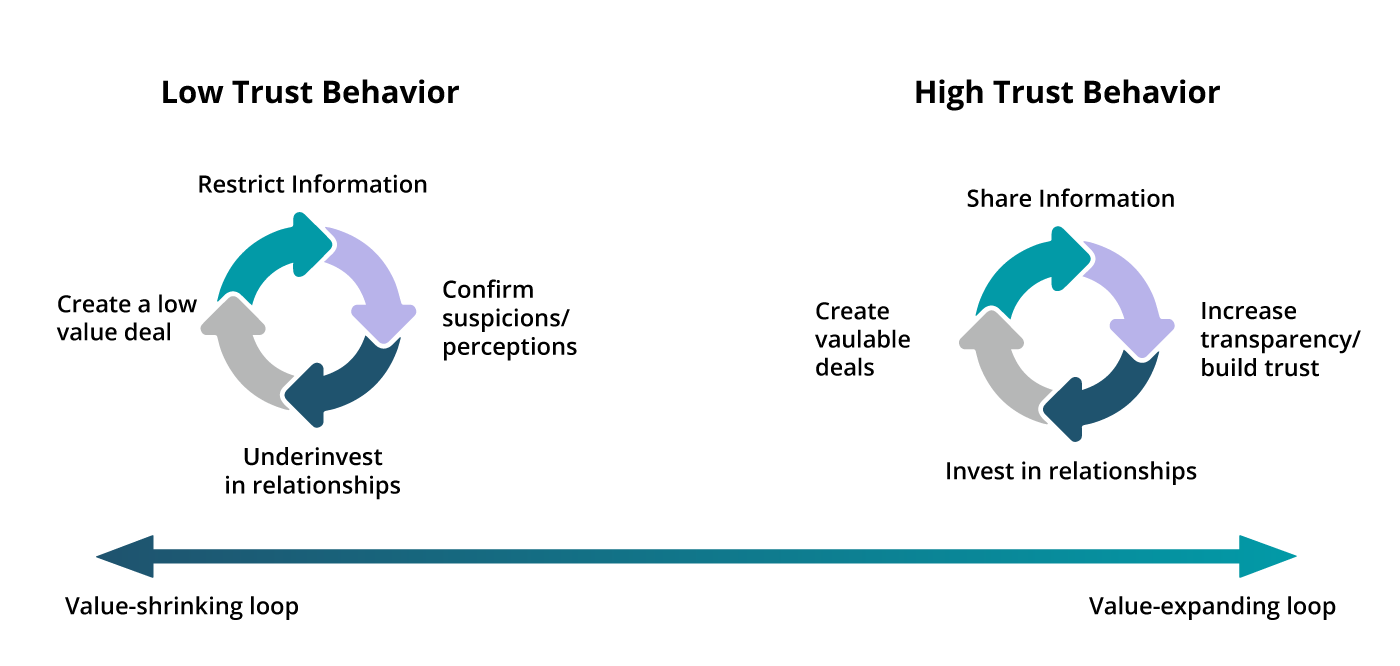
Trust is a Business Imperative on Capital Projects Today
* All parties come to a capital project with the same intentions: 1.) To safely construct a well-functioning final product that satisfies the customer, and 2.) To maximize their own company’s profitability.
* The good news; Well–managed projects with high collaboration and trust between owners and constructors are much more likely to be profitable.
* Inevitably, however, schedule, cost, and technical issues that arise must be addressed quickly to achieve business goals.
* Experience confirms that how business partners respond to each other when problems arise is based upon the degree of “earned trust”, or lack of it, in the relationship.
Increasing Trust Between Owners & Contractors Must Be A Priority on all Capital Projects Today. This is where Team Development Consulting Comes in.

Symptoms of Low Trust on Teams

A Project’s Culture is Shaped by the People at the Top


Food For Thought
The way owners and contractors answer the following question can have a significant impact on the project’s success:
“Do you trust each other well enough to succeed together?”
Our clients have found TerconPartner’s Relationship Pulse Survey® to be a practical tool for quickly finding the answer to this important question.
To determine the current level of trust between an Owner Organization and a Contractor Organization, or between a Prime Contractor and a Sub Contractor, Tercon‘s Relationship Pulse Survey® is a useful tool. It provides a quick and insightful analysis of:

1.) The current strengths and challenges impacting the relationship,
2.) How disagreements are being handled, and
3.) Options for improving the relationship that will drive business success for the parties going forward.
What our Clients are Saying
“For many years TerconPartners has been a trusted partner in aligning and developing our teams across multiple geographies and cultures. Their assessments, training, and coaching processes are very effective.”
– Vice-President of Projects, Fortune 100 Oil & Gas Company
“When our project’s interface management process was not working well, TerconParnters worked with the Integrated Project Leadership Team to assess strengths and weaknesses and ensure a more efficient process was in place.”
– Project Executive, Major Capital Project (U.S.)
“Tercon is a valued partner who can facilitate at the interface between our contractors and subs in a way we can’t without inserting undue influence.”
– Director of Projects, Global Energy Company
A Project’s Culture is Shaped by the People at the Top
To determine the current level of trust between an Owner Organization and a Contractor Organization, or between a Prime Contractor and a Sub-Contractor, Tercon’s Relationship Pulse Survey™ is a useful tool. It provides a quick and insightful analysis of:
1. ) The current strengths and challenges impacting the relationship,
2.) How disagreements are being handled, and
3.) Options for improving the relationship that will drive business success for the parties going forward.
For more details about the survey and how the results are reported and shared with the client in a customized coaching session,
Contact us at 913-488-5914 (toll free) or Email us at info@terconpartners.com
